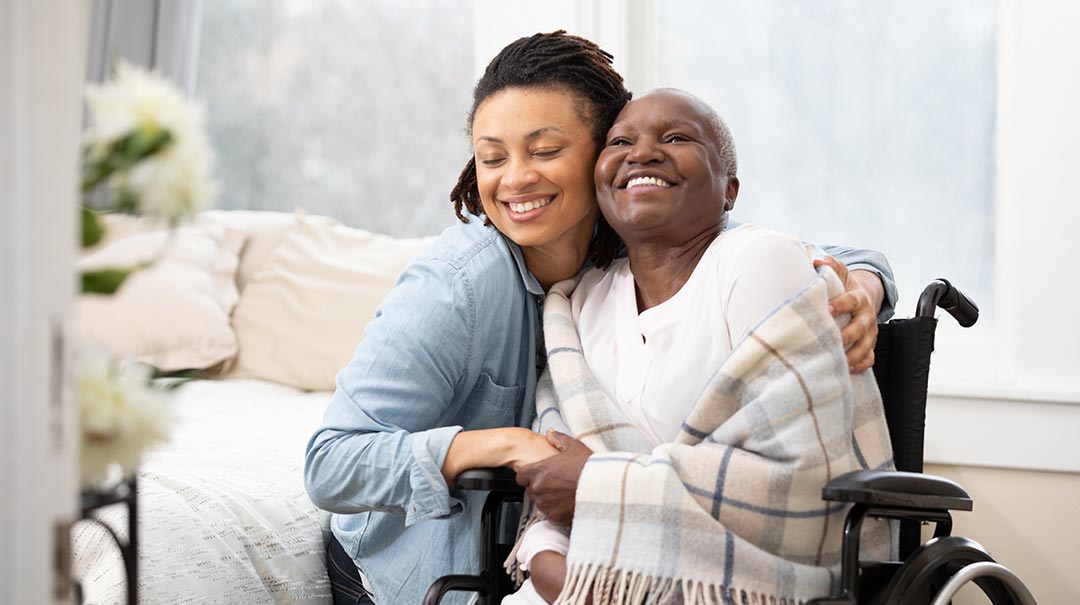Find care now
If you are experiencing a medical emergency, please call 911 or seek care at an emergency room.

People all around the U.S. care for a loved one—whether it’s their mom, dad, grandparent, aunt, or uncle. As a geriatric and house call doctor, I see a variety of common problems these caregivers face, ranging from falls to the misuse of medications.
Falling is the most common hazard we see in the elderly. These falls can lead to hip fractures, which can have a significant effect on mortality rates over the next year. In fact, nearly 30,000 adults over 65 die annually in the U.S. because of a fall. Seniors are at increased risk for falling because of decreased or impaired vision. There is also a loss of balance and muscle strength, causing them to not lift their feet as high in order to avoid simple obstacles in their path.
Our geriatric team of doctors and nurses visited one woman who was living alone. We saw that she had no handicap accommodations, despite her weakened muscles and increased falling risk. Additionally, she experienced mild depression that was beginning to impact her adherence to medication. We were able to help her move into a handicap-accessible apartment with wider doorways and handrails. Not only was the new apartment safer for this patient on a physical basis, but her depression also improved dramatically once she was able to move around more due to the safer environment.
LISTEN: Dr. Torres discusses tips to care for the elderly in the Medical Intel podcast.
How to Care for Older Relatives at Home
Many caregivers overlook steps they can take to help their elderly loved ones. Common tips that we provide caregivers include:
- Reduce clutter in the house: Be aware of rugs and items that are left on the floor, as they can lead to a fall.
- Have good lighting: Adequate lighting from lamps and light fixtures helps seniors avoid falls from impaired vision.
- Make sure they wear their glasses: Good vision is critical to elderly people, as they walk around or complete their daily tasks.
- Make sure they are safe driving: The ability to drive changes with age, as reaction time diminishes, visual and hearing changes occur, and osteoarthritis of the spine can develop and make it difficult for them to turn their head. Consider riding with them occasionally to ensure they are driving safely; and if they aren’t, encourage them to give up their license and make other arrangements for transportation.
- Minimize time on stairs: Try to minimize the need for your loved one to go up and down stairs by moving them onto a single floor. If this isn’t possible, ensure handrails are installed.
- Have open communication: It’s important that we don’t just assume our older relatives are doing OK because they’re not asking for help. Many times, they will do everything they can to not bother their family members and friends. The more open communication is, the more likely our loved ones will tell us of a problem.
Taking Medication Properly
Some medications make elderly patients feel sleepy or dizzy, which can increase their fall risk and impair their ability to manage their household. These medications commonly include over-the-counter sleep aids and antihistamines such as Benadryl, which help with congestion, sneezing, and hives.
The elderly also can overuse or misuse them because of forgetfulness. We try to reduce this by keeping track of their pill bottles every day. Additionally, some medication regimens are complicated, so it’s important that we provide the elderly with written instructions and regular conversations on when and how much to take. Using pill boxes that have a compartment for each day of the week or time of day also can help. Plus, there are even smartphone apps out there that can provide reminders on when to take medications.
Related Reading: How to Manage Medications in the Elderly
How We Can Help
Our team visits patients’ homes, so we have a good sense of any environmental obstacles they face. In fact, we do environmental assessments and make specific recommendations to ensure the senior lives in a safe environment. We also can connect seniors with eye doctors and surgeons, and ear, nose, and throat doctors to help make sure the senior’s sight and hearing are optimal.
We always suggest that patients have a good relationship with their primary care doctor. Although elderly patients often see specialists for specific conditions, this fragmented care is not in their best interest, because one specialist can prescribe medication that interacts with other medications prescribed by another specialist. A primary care doctor can provide patients with oversight on all their medications.
Providing proper care for an elderly relative requires caregivers to pay close attention to them and their environment while having open communication. Consider these tips to improve your loved ones’ quality of life and well-being.














